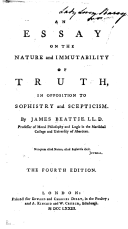An Essay on the Nature and Immutability of Truth
 | |
| Author | James Beattie |
|---|---|
| Country | United Kingdom |
| Language | English |
| Subject | Epistemology, truth |
| Published | 1771 |
| Media type | |
| ISBN | 978-1421204208 |
An Essay on the Nature and Immutability of Truth is a 1771 book by the Scottish philosopher and poet James Beattie, his major work.[1] The book enjoyed wide popularity.[2]
Summary
The book begins with a definition of truth, as "what the constitution of our nature determines us to believe." Common sense is identified as “that faculty by which we perceive self-evident truth,” whereas reason is "that power by which we perceive truth in consequence of a proof." Beattie then argues that the evidence of perception generally reliable; that everything which ever "begins to exist" has a cause; that nature is uniform; and therefore that human testimony is essentially trustworthy.[3]
Beattie criticizes David Hume for promoting skepticism, arguing that Hume's views led to moral and religious evils. Beattie holds that the mind possesses a common sense, or power for perceiving self-evident truths. Common sense is instinctive and unaltered by education, and truth is what it leads the mind to believe.[1]
The book also challenges racism evident in David Hume's essay 'Of National Characters'. Responding to Hume's assertion that "I am apt to suspect the negroes to be naturally inferior to the whites,"[4] Beattie writes "[t]hat the inhabitants of Great Britain and France were as savage two thousand years ago, as those of Africa and America are at this day."[5]
Influence
An Essay on the Nature and Immutability of Truth was published in German translation in 1772, and influenced Immanuel Kant, helping him to understand Hume and aiding in the development of transcendental idealism.[1]
References
Footnotes
Bibliography
- Books
- Kitcher, Patricia (1999). Audi, Robert, ed. The Cambridge Dictionary of Philosophy. Cambridge: Cambridge University Press. ISBN 0-521-63722-8.